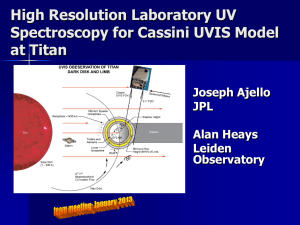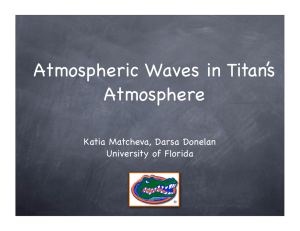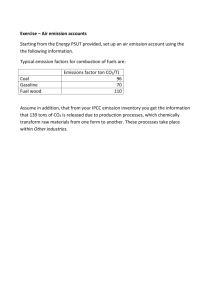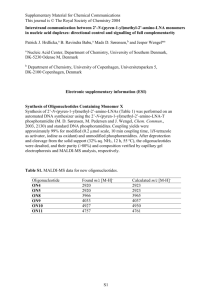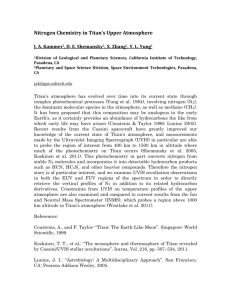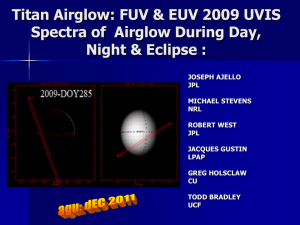UV Laboratory Studies of N and Cassini
advertisement
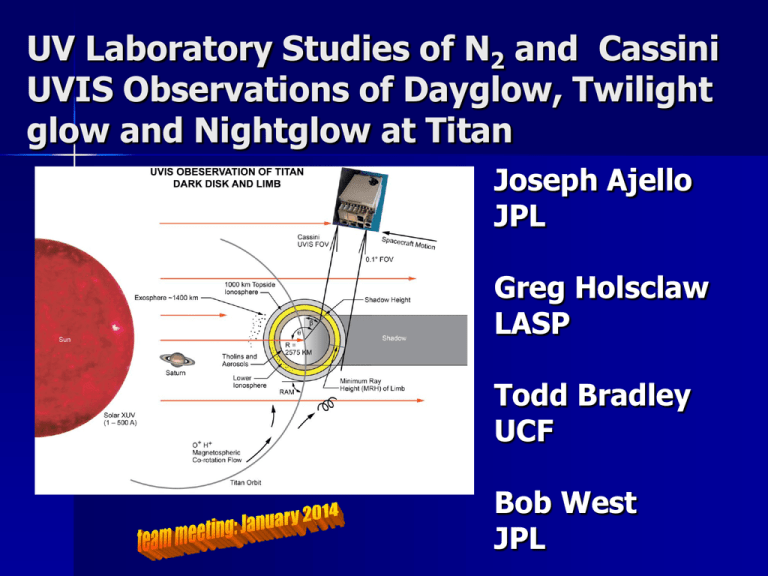
UV Laboratory Studies of N2 and Cassini UVIS Observations of Dayglow, Twilight glow and Nightglow at Titan Joseph Ajello JPL Greg Holsclaw LASP Todd Bradley UCF Bob West JPL CIRS 2011 2.5 Hour Set of 36 Titan UVIS Dayglow Observations Near Zero Degree Phase: Equator to Pole Titan Dayglow EUV Intensities with Latitude are a Chapman Layer with SZA Comparison High Resolution Lab Spectrum and Titan UVIS High-resolution (FWHM = 0.2 Å) extreme-ultraviolet (EUV, 800−1350 Å) laboratory emission spectra of N2 by electrons at 20 and 100 eV. A total 491 emission features observed from N2 electronic-vibrational transitions and N I, II multiplets. The photoelectron-PDI excited dayglow limb EUVS emission spectrum observed by the Cassini UVIS from Titan June 22nd 2009 The EUVS limb (8001200km) dayglow of Titan by Cassini UVIS (blue curve) compared to lab spectra at 4–5 Å FWHM forv20 (red) and 100 eV (green) electron energies. Strongest features are indicated [Stevens et al.,2011]. N2 Diabatic (crossing) Potential-energy Curves for 1S + and 1P excited states for Cassini UVIS Titan u u EUVS Emission N2 electronic transitions from X 1Σg+ ground-state to closely-spaced (12–15 eV) 8 observed states for Cassini EUVS emission: the b, c3, c4, and o3 1Πu states; the b', c'4, and c'51Σu+ states;. Strong perturbations mix Rydberg (n>2) and valence states (n=2) of like and unlike symmetry with spin-orbit 3Π predissociation, also u rotational perturbations. + Electron-impact-induced fluorescence lab and model spectra 912 Å - 974 Å for 20 and 100 eV. Experimental (blue), model (red) spectra & residual difference (grey). N2 spectra compared with a quantummechanical model simulates electronimpact excitation, fluorescence and predissociation. Model of N2 excited states solves a coupled-Schroedinger equation (CSE) for radial (vibrational) motion of the molecule. Electron-impact-induced fluorescence lab & model spectra 974 Å - 1020 Å for 20 & 100 eV. Factor of 10 Reduction of c'4(0,0) due to selfabsorption leads to 959Å,… recycling & enhancement of c'4(0, v''>0) 980, 1002Å fluorescence. CSE model partitions lab fluorescence between 491mfeaturesbwhich are partially blended. A clear example of this utility is the group of N2 bands between 1006 and 1012 Å, distinguishable when band profiles known. Electron-impact-induced fluorescence lab & model spectra 1130- 1186 Å for 20 & 100 eV. Strongest molecular emission c'41S+u→X 1S+g Carroll-Yoshino bands. New members of the c'4 (0, v'') progression observed in the lab, unexpected emission to v''=5–9 as observed in at Earth by the FUSE satellite (Bishop et al., 2007) from homogenous coupling to b' 1S+u states like c'4 (0,8) 1156 Å & c'4(0,9) 1183 Å. The lab UV emission & model of c'4(0,1) & c'4(0,9) bands by 20 eV e-impact Measured 20 eV spectrum compared to model strengths of rotational transitions. Emission from broad envelope of P- and R-branch rotational lines for c'4(0,1), while c'4(0,9) emission from excited state levels with J=10 and 11 The Q(v‘, v‘’’) 20 & 100 eV Emission cross sections of c'4(v'). Vibrational c'4 cross sections plotted with model calculations. Model emission cross sections agree with measured values, validating CSE & necessity of modeling homogeneous coupling between c'4 1Σ+u and b' 1Σ +u states, when calculating c'4 (0,0–3) emission, a point further demonstrated for higherv" . Experiment and model emission cross sections for eight N2 band systems High Resoltuion e-impact fluorescence spectrum convolved with 5 Å FWHM IP Lya Cassini FUV Observation Titan Dayglow FUV Intensities with Latitude are a Chapman Layer with SZA CIRS 2011 48 minute Set of 12 Titan UVIS Nightglow Observations o and (SZA=132 ) FUV Nightglow on Disk Twilight (SZA=112o) Glow on Limb
